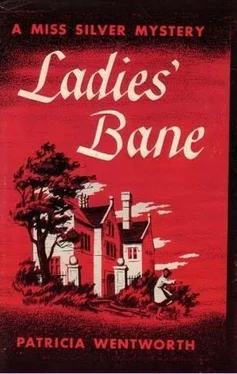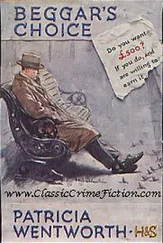“No one can stop Nannie talking,” he said. “But she doesn’t generally talk so much-about Barbara and me. I think perhaps she thinks you ought to know the worst.”
“She said you never changed.”
“I don’t think I do-much. Would you find it dull?”
“I don’t think so. I’m not very changeable myself-I mean about my friends.”
“I wasn’t talking about friends. I was talking about us.”
She said rather faintly,
“It’s too soon, Jim.”
He looked surprised.
“I don’t know what there is soon about it. I knew at once-well anyhow the second time for certain. And then I tested that by staying away, and it only got stronger. You did say once that you felt as if you had known me a long time.”
She looked up, began a smile, felt it tremble, and looked down again.
He said, “You see?” and put his arm round her. “And when I was waiting in the hall in that blasted flat and I didn’t know whether we were going to bring it off or not-well, I’m not going to tell you what I felt like then, but things don’t hurt as much as that unless they are for always. Of course you can have as much time as you want-if you really want it, but I hope you don’t. You see, you won’t want to go and live in that flat of Louisa’s now-at least I shouldn’t think you would.”
Ione was unable to repress a shudder.
“Oh, no!”
“Well, I supposed you would feel like that, so I thought it would be a good plan to get married, and then you could come and live here.”
She looked up again, this time with spirit.
“Darling, people will do most things for a flat, but Ï draw the line at marriage.”
His arm tightened.
“You are to be serious! How did you feel when you knew I was bringing you here?”
Ione said, “Safe.”
“I felt as if I was bringing you home. I want to know whether you felt that way too.”
Ione had one of her impulses. What did it matter how long they had known each other in the stupid measurements of time? What did it matter what people thought, or what people said? This was the place where she belonged.
Jim’s voice was insistent.
“Ione, didn’t you feel like that- didn’t you?”
With something between a laugh and a sob she put her head down on his shoulder as she had done in the taxi and said,
“Yes, I did.”
Did you think it was the woman?” said Frank Abbott. “In the end it lay between her and Trent, with quite a good chance that they were in it together. It’s a bit of luck for him that the Delauny couldn’t resist crowing over Ione Muir and making out how clever she was. And that there were two witnesses to what she said. Curious how the criminal must crow to someone. In this case, of course, she thought she was perfectly safe. Ione wasn’t going to live to give anything away, so she could have a good time getting it off her chest and no harm done. If she hadn’t been so explicit, Trent might have found it hard to clear himself. Which brings me back to where I started. Honest now-when it became clear that it must be one of them, which of them did you think it was?”
Miss Silver looked at him across the last stocking of the set which she was knitting for Roger, the youngest of her niece Ethel Burkett’s three boys. Three pairs for Johnny and three pairs for Derek had already been despatched, and by tomorrow this set also would be in the post and she would be able to turn her attention to something pretty for little Josephine. She said gravely,
“I have tried to keep a perfectly open mind, but there was something about Jacqueline Delauny which arrested my attention. First impressions are of great importance, and both in her case and in that of Mr. Trent I received them during the inquest upon that poor girl Margot. It was plain that both were under the influence of some very strong feeling. In Mr. Trent’s case it really did appear to me to be grief, bearing out what I had heard of his affection for his ward. Miss Falconer talked about him a good deal, you know. From what she told me, and from my own observation, he appeared to me to be of a simple and affectionate disposition. I had, of course, to be on my guard against being too much influenced by her partiality. But it was not only in Miss Falconer’s opinion that he stood high. Even sour old Humphreys had to some extent attached himself. My own impression deepened continually. Simplicity, kindness, a mind neither subtle nor clever-such people have few qualifications for a criminal career.”
Frank did not allow himself to laugh.
“And Delauny? You got the impression that she might qualify?”
A slight cough reproved this levity.
“Owing to the position of my seat, I was able to observe her closely during the progress of the inquest. The first thing that struck me was that she was dramatizing the occasion. All that dead black, where the two ladies of the family had been content with something quite simple and unobtrusive. But to dramatize a situation does not necessarily imply guilt. There are quite well-meaning people who have this habit, but they are as a rule self-centred and unstable. Miss Delauny appeared to me to be under the influence of some very strong emotion. Such a feeling is extremely difficult to hide, and though in this case it might be supposed that it was connected with the dead girl, I did not get the impression that the emotion was grief. It seemed to me to be linked with Miss Delauny’s awareness of Mr. Trent, and to be susceptible of a very personal interpretation. I also felt sure that she was afraid. She was being very careful about her face, but as she held her hands together in her lap they strained until I expected every moment that a seam of her glove would start. In the witness-box she was calm. There was a rush of tears to the eyes when she was asked whether Margot had been reproved or punished for the tricks which she so often played. In what seemed like a genuine burst of affection and grief she said, ”Oh, never!” and went on to explain that in such cases punishment only served to confuse the abnormal mind. The Coroner was, I discerned, a good deal irritated by these remarks. But the desired impression had been made. If there was anything to find fault with in the girl’s treatment, it was on the side of too much indulgence. Later, when we were all leaving the hall, I had the opportunity of watching Miss Delauny. She had a handkerchief clenched in her gloved hand. She put it suddenly to her lips and held it there. At the same time she became aware that I was watching her. She looked down, but not quite in time. There had been a certain expression in her eyes, and the more I thought about it, the more convinced I became that what I had seen was a momentary unguarded spark of triumph.”
“Triumph?” said Frank in a meditative voice.
Miss Silver inclined her head.
“I became increasingly certain that it was something more than relief. Even the latter would have seemed inappropriate. In someone genuinely fond of the poor girl the mood one would expect was one of genuine sadness and regret, sympathy with Geoffrey Trent, and relief only to the extent that a painful ordeal was now over. But I was aware of feelings more intense than these, and without having any definite ideas upon the subject of foul play, I began to wonder whether an obstacle had not been removed. Miss Josepha Bowden had commissioned me to come down here with a view to setting her mind at rest upon the subject of Mrs. Trent. I had nothing reassuring to report. The poor girl was a drug-addict, and I had to consider whether her husband was in any way responsible for her state. I found myself unable to believe that this was the case. Especially as the plan of the projected crime developed. It was Miss Muir’s life which was primarily aimed at. It was she who was to be pushed off the island at Wraydon in order that her very considerable fortune should pass to her sister. Mrs. Trent would then, but not until then, be able to make a will in her husband’s favour. If she herself were to die first, her fortune would merely pass to Ione Muir. In the absence of a child, Mr. Trent could inherit nothing as long as his sister-in-law lived.”
Читать дальше












